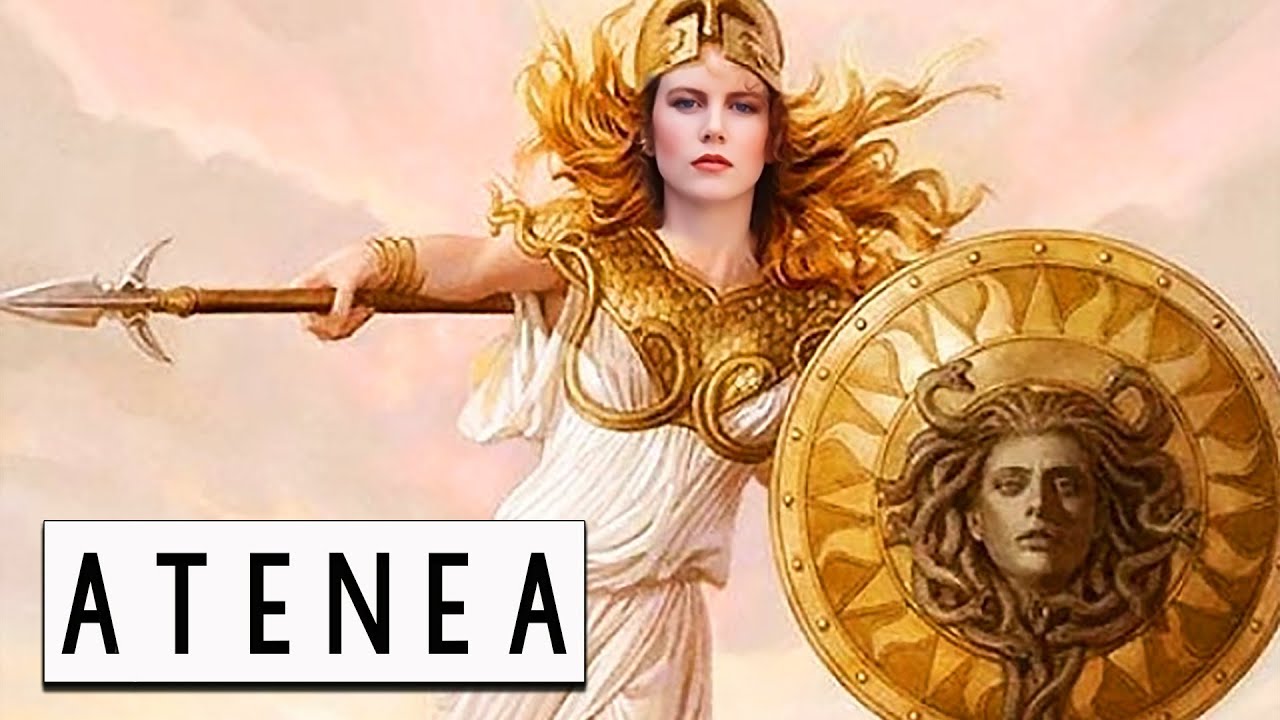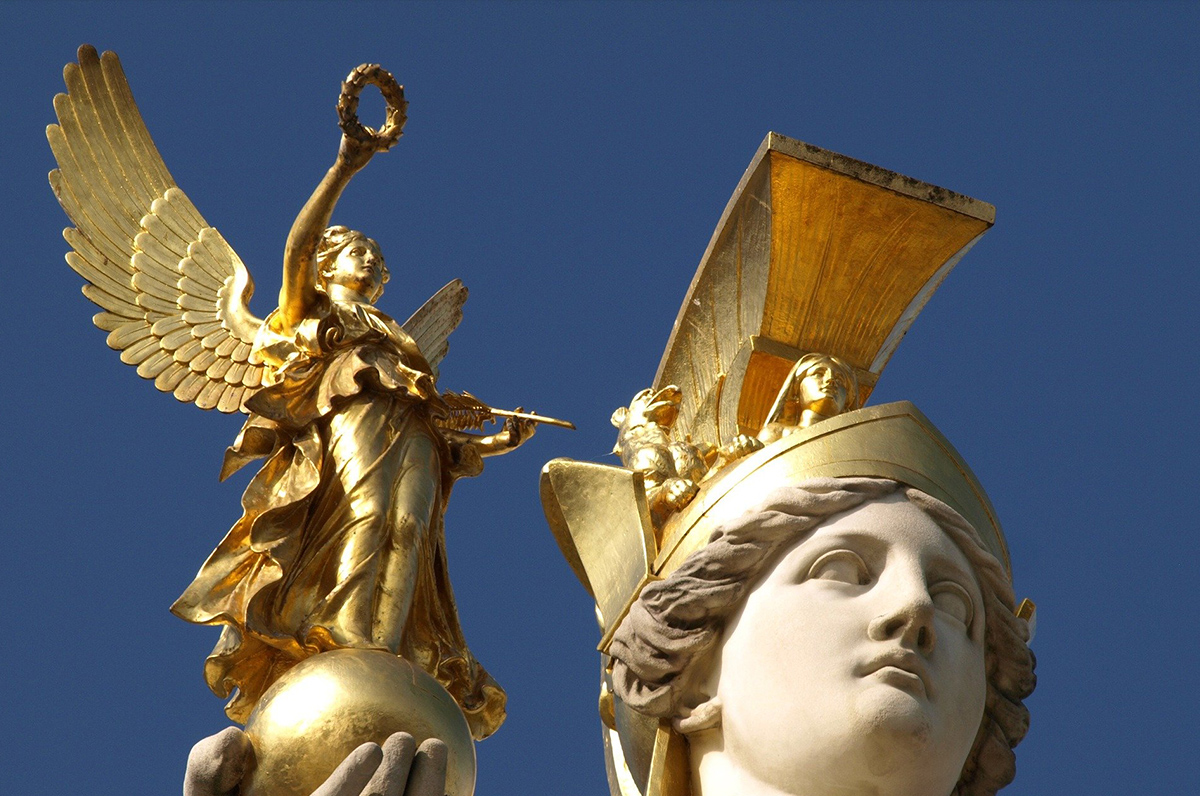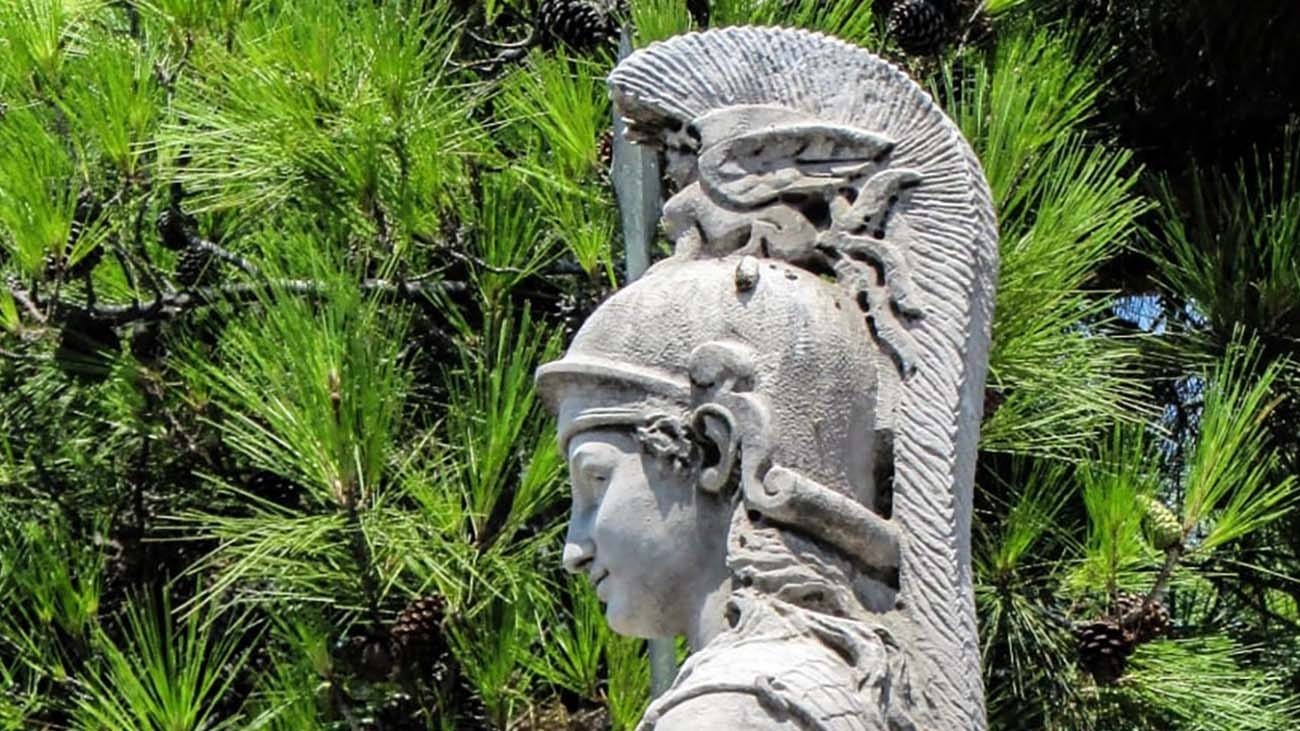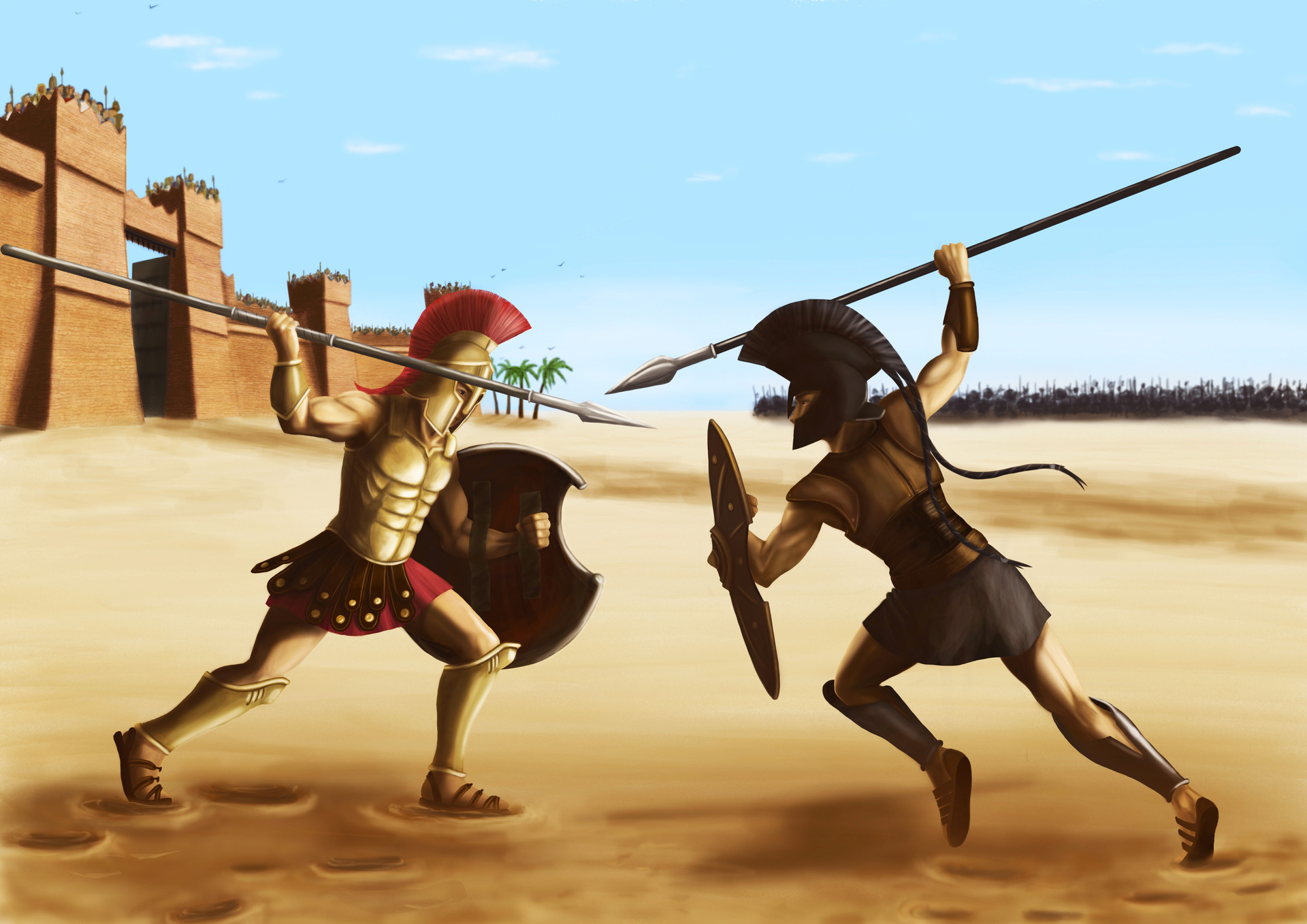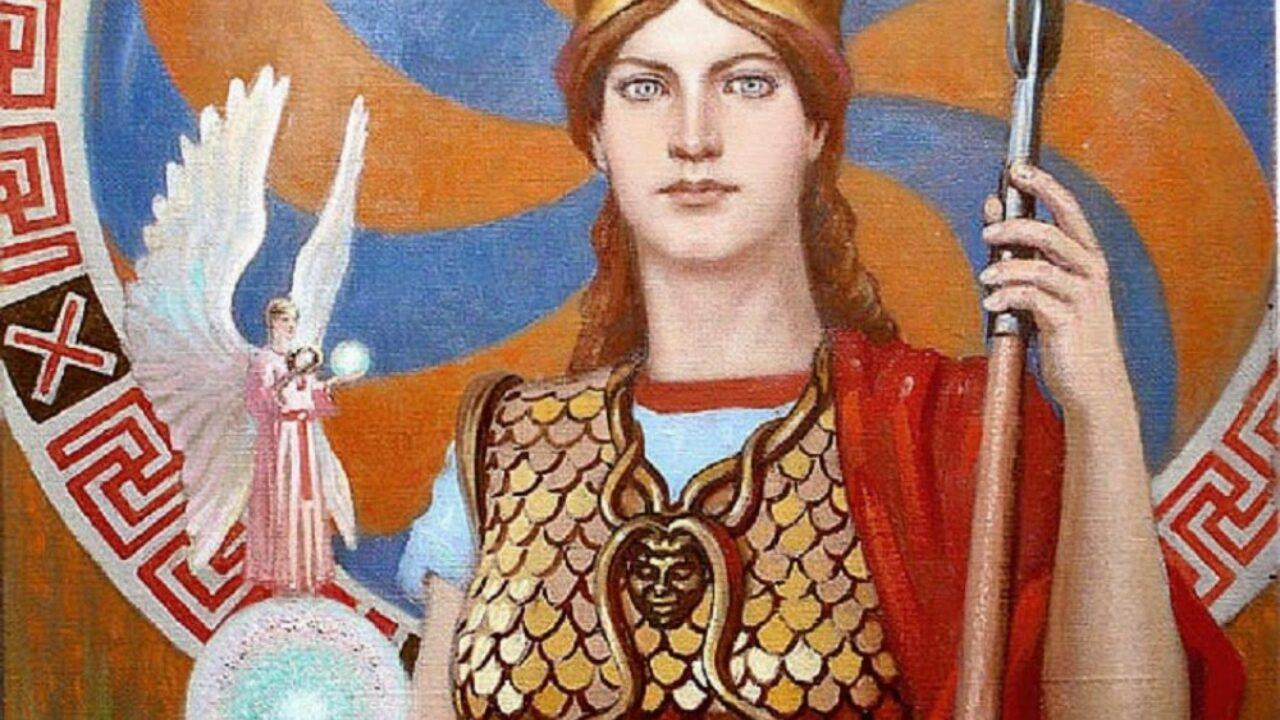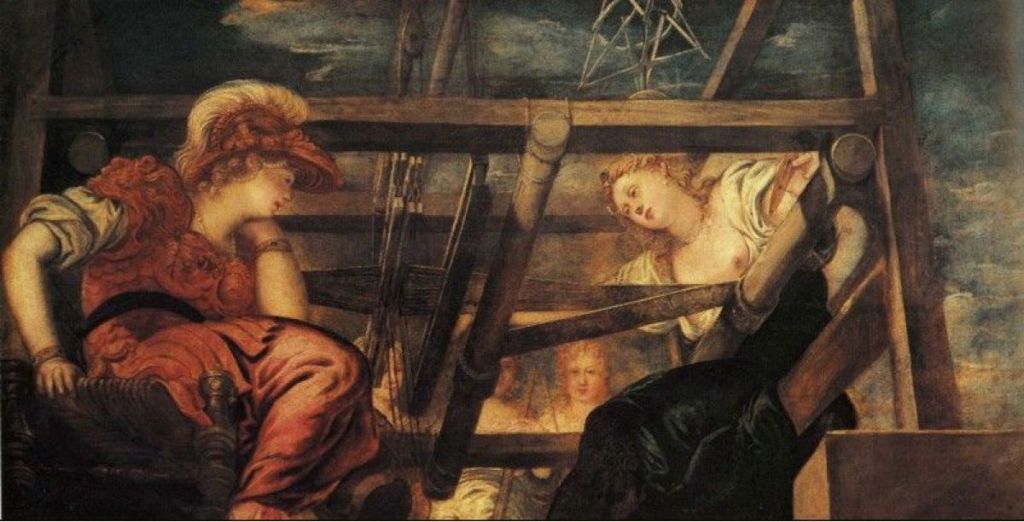In the Hellenic pantheon we can find a large number of powerful figures, who had an influence on the life of Greece. Among them stands out Atenea, originally worshiped as a goddess of manual labor, was later associated with the field of war. Learn all about this powerful Greek deity!
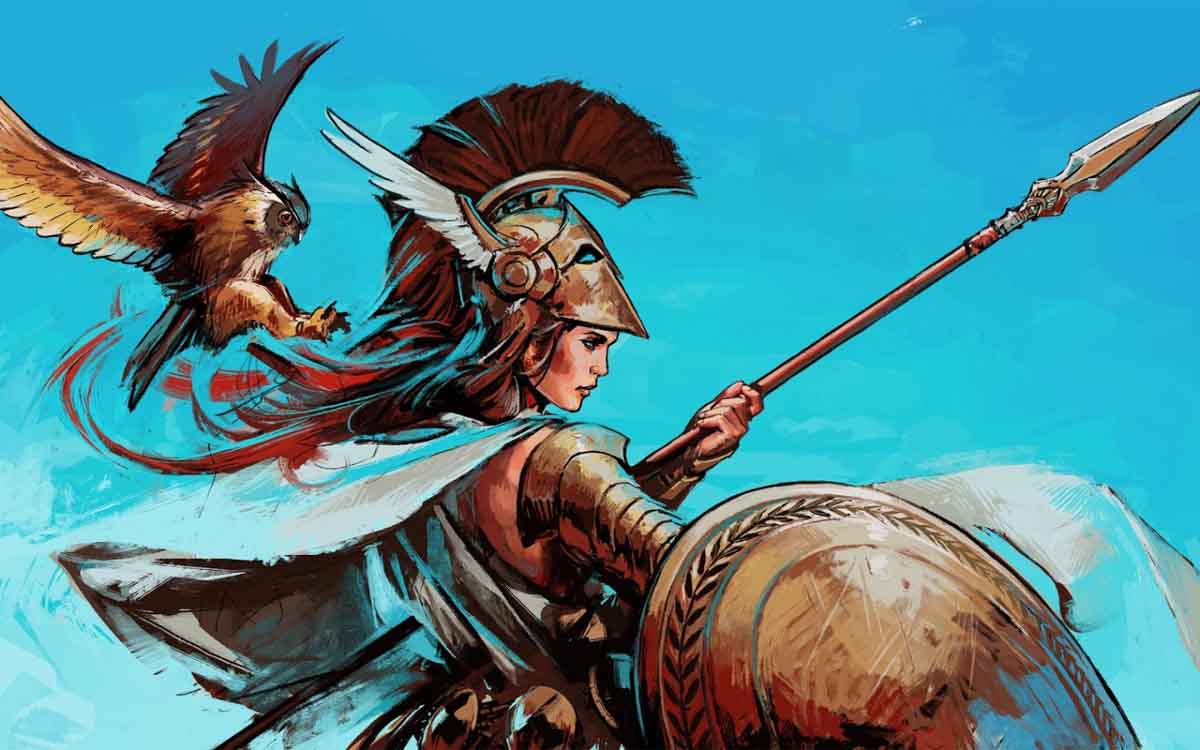
Who is Athena?
Athena, in the Hellenic religion is the deity that protects the city, goddess of war, crafts and practical reason, identified by the Romans under the name of Minerva. She was essentially urbane and civilized, the antithesis in many ways of Artemis, goddess of the outdoors with whom she is associated.
It is stated that this deity is very old, probably of pre-Hellenic origin and was later adopted by the Greeks who gave it other characteristics and peculiarities. However, the Greek economy, unlike that of the Minoans, was almost entirely of a military type, in this way the adopted goddess, although her previous functions, more of a domestic type, were recognized, became a powerful goddess and warlike, the deity of war.
She was the daughter of Zeus, who emerged as an adult from her forehead and not from a mother figure. There was an alternate story that Zeus swallowed Metis, the council goddess, while she was pregnant, so that this goddess finally emerged from Zeus, being the favorite daughter of the god of gods ever since, there is no doubt that she had a great power.
Athena's association with the Greek acropolis was probably due to the location of the kings' palaces there. She was thought to have no consort or issue and at some point in history she may have been described as a virgin, so it is an attribute that follows her from very early on and was the basis for the interpretation of her epithets Pallas and Parthenos.
As a goddess of war, this relevant figure was not under the power of other deities, Athena could not be subdued by other goddesses, such as the explosive Aphrodite, a deity of great power as well and who had not skimped on facing her.
As a goddess of the palace she could not be raped, something that kept her safe from the passionate and in some cases unscrupulous Olympic gods. In Homer's Iliad, Athena, as goddess of war, inspires and fights alongside the Greek heroes; her help is synonymous with military prowess.
Also in the Iliad, Zeus, the chief god, specifically assigns the sphere of war to Ares and Athena, both of whom would then be powerful deities of war and combat. Athena's moral and military superiority over Ares derives in part from the fact that she represents the intellectual and civilized side of warfare and the virtues of justice and skill, while Ares represents mere bloodlust.
The superiority of Athena is related to the great variety and relevance of the functions attributed to her and to the great patriotic feeling of those who preceded Homer, who did not give Ares the same importance because he was a foreigner, a god who came from a strange land. In the Iliad, Athena is the divine form of the heroic and martial ideal: she personifies excellence in close combat, victory, and glory.
All the skills and qualities that make the difference in battle and that always give him victory in his combats are concentrated in his aegis or breastplate: fear, contest, defense and assault. This deity is in the Homeric work known as the Odyssey, the deity who is in charge of protecting and guiding Odysseus and the myths of some sources after that, describe her in a very similar way, the protector and guide of characters such as Perseus and Heracles. .
As guardian of the welfare of kings, Athena became the goddess of good advice, prudent moderation and practical insight, as well as war. Essential virtues for royalty in Ancient Greece. In the post-Mycenaean civilization, the city, in particular its citadel, replaced the palace as the ancient domain of the goddess. The figure of her was venerated in many places in the lands of yesteryear, but today it is usually associated exclusively with the city of Athens, whose name is a tribute to the deity.
Her influence and cult under the name Athena Polias the guardian and protector of the city, was the watchful observer and the companion in the changes that made Athens a democratic land, leaving behind her city-state days of the monarchy.
The reverence for the goddess in this city was reflected in the pediments of the Parthenon, where fragments of her life can be seen, such as her birth and the famous confrontation with the god of the sea, Poseidon for the leadership of the city that bears her name since then. .
Another trace of his importance and his cult was the festival of the Panathenaic, held in the month of July, where his birth and life were celebrated. His adopted son Erichthonius, one of the monarchs of Athens, is known in history as the person in charge of the Panathenaic festival, which was enjoyed every four years to honor the deity.
The festival included a magnificent procession through the city, the presentation to Athena of a peplo or robe, usually woven, representing the Gigantomachy, and fearless athletic games. The winners of these games, in addition to glory and credit, were honored with amphorae decorated with images of Athena, which contained high-quality olive oil inside.
But her cult is not limited to this city, she was loved and respected in cities with a military tradition, such as the well-known Sparta. She also in her role as founder of Thebes in Boeotia and in Corinth, where she appeared on the coins of the city.
Symbols and representations
This female deity was related to some birds and was mainly associated with the owl, a figure that is found together with the viper among the symbols of the city and therefore of the goddess. Athena is known as the goddess of craftsmen, long before she became the owner and mistress of war, during times of peace they were the attributes for which she was most remembered.
She was particularly known as the patron saint of spinning and weaving, over time she was eventually recognized symbolically as a divinity personifying wisdom and righteousness, a natural development of her patronage of skill.
Athena was usually depicted wearing body armor and a helmet and carrying a shield and spear. Two Athenians, the sculptor Phidias and the playwright Aeschylus, contributed significantly to the cultural spread of the image of Athena.
She inspired three of Phidias's sculptural masterpieces, including the massive gold and ivory chryselephantine statue of Athena Parthenos that once stood in the Parthenon and is mentioned in Aeschylus's dramatic tragedy Eumenides. In this the goddess Athena announces that a jury of twelve men from Athens judge Orestes and consider whether he is worthy of punishment. It is then said that he founded the Areopagus (the aristocratic council of Athens).
Name and epithets
The epithets of Athena were numerous, they include Pallas (girl) and Parthenos (virgin), at the height of which, she is illustrious and distinguished among the gods of Greek mythology, especially for not allowing illicit relationships with other divinities, demigods. or deadly. Other epithets were:
- Promachos (of war), perhaps referring to a more patriotic, defensive and strategic war, rather than an attacking war, in contrast to his more aggressive and conflict-loving brother, Ares,
- Ergane when they refer to their relationship with crafts
- Nike, the personification of the ideal of victory.
personality of the deity
As goddess of wisdom, strife and craftsmanship and favorite daughter of the supreme god Zeus, she was surely the most intelligent thinker, fearless, courageous and undeniably skillful and acute of the gods of the Olympian pantheon.
However, according to ancient tales it was very clear that the goddess was not to be trifled with, as evidenced by her transformation from Medusa to a Gorgon. Her sense of justice was such that acts of impiety were quickly avenged, as was the case with archaic heroes after the capture of Troy and the desecration of the goddess's sanctuary.
Athena is generous with the human being, she was often associated with household crafts and is said to have given mortals the gifts of cooking and sewing. It is also said that she was cheerful and a little vain, that she invented the aulos, but seeing her reflection and her puffy cheeks playing these flutes, she threw them to be picked up by the satyr Marsyas.
In mythology
This deity has many references in Greek mythology, especially those related to heroes, great battles or intrepid adventures. She was protector of Hercules, Athena often helps him in his twelve labors, for example when she holds the world while Atlas searches for the sacred apples of the Hesperides.
Perseus was another of his favorites and was given a shield to protect himself on his quest to kill Medusa. On the other hand he was always on Achilles' side and helped him kill Hector. Her pupil Odysseus also often benefited from Athena's wisdom, for example when the idea came to his mind to dress as a beggar on his return to Ithaca and not to mention that he was also protected from the arrows of his rivals when expelling of the palace to the intruders.
Jason was another hero who benefited from Athena's ingenuity when she encouraged Argo to build the first Greek ship, which would bear her name and the fame of the Argonauts.
Athena was one of the main protagonists of Homer's account of the Trojan War in the Iliad, where she supports the Achaeans and the heroes who fought in battle, especially Achilles, to whom she gives encouragement and wise advice.
Other characters also received his favors, such is the case of Menelaus, who is saved from the arrow of Panderos and Diomedes, whose spear, in a notable episode, deflects to wound Ares himself. She also gave Odysseus protection and is credited with giving him the idea for the Wooden Horse.
Ancient writers, including Homer and Hesiod, often call her by different names in their stories, so it is common to read terms like the bright eyed y Tritogeny referring to the deity. She is also frequently referred to in tales as the Goddess of Booty, the Goddess of Enchanting Hair, and Alalkomenaian Athena.
She had no comparison with other Greek goddesses because she was wise, fearless and lethal, for example Aphrodite was an explosive divinity who came second when she faced Athena.
The Acropolis, the beloved city of Athena
This deity is closely associated with Athens, the city named after her in honor of the people of Attica who chose her as their patron after their gift of the prized olive tree, a symbol of peace and abundance in ancient Greece.
Many of the legacies of Athens to the world are expressed in the natural center of the city and its surroundings. The Acropolis declared a World Heritage Site in 1987, rises some 500 feet above sea level, with springs near the base and a single access, the Acropolis was an obvious choice for a citadel and sanctuary of its goddess and protector from the earliest times. time.
The Parthenon temple from the XNUMXth century BC. C., which continues to dominate the city's acropolis to this day, was built in her honor and is one of the brightest jewels of the treasure of humanity and of Athens, where traces of the protective goddess remained for posterity, in beautiful artistic samples.
At first glance deceptively simple, this elongated, colonnaded temple is the expression, without a trace of tension or conflict, of a human ideal of clarity and unity. The architectural genius is concentrated on the outside, because inside there was a refuge for the goddess Athena, the patron saint who lent her name to the city, it was not a place for mass worship, only for the permanence of her beloved goddess Athena.
Its spiritual quality, the feeling of being almost afloat, is enhanced by the lack of a single straight vertical line in the peristyle, each vertical is tilted almost imperceptibly and is theoretically about 11.500 feet in the sky.
The columns, decreasing in thickness towards the center of the colonnade, with decreasing space between them, also slope towards the center, differences that are virtually invisible to the viewer. Even the fluting on each column decreases in width as it rises, and the humblest details of the craftsmanship are perfect. A supernatural structure, like the goddess who protected them and to whom they paid homage in many different ways, this is a small sample of the city that loved the goddess of war and whose affection was reciprocal.
Myths and stories about Athena
Most of the Olympian gods have very interesting myths and history, which were very important among the people of ancient Greece. The most famous myths featuring the goddess Athena include:
The birth of Athens
Recounted by Hesiod, in his work, Theogony, Athena the bright-eyed was conceived by Metis who could not give birth, because Zeus, who received advice from Gaia and Ouranos, decided to swallow her. So Athena her adult daughter was born to her father and not to Metis, her mother.
Now Zeus, king of the gods, first made Metis (the wise council) his wife, and she was the wisest among gods and mortal men. But when he was about to give birth to the bright-eyed goddess Athena, Zeus cunningly deceived her with words and decided to put her in her own womb, as advised by Gaia (Earth) and the starry Ouranos (Heaven). .
Gaia and Ouranos assured Zeus that only he should exercise real dominion over the eternal gods. But that power would be threatened by one of his children with Metis.
Metis the Titaness would have two children from her union with the lord of the gods: the bright-eyed maiden Tritogenia, equal to her father in strength and wisdom. She would also give birth to a son with an authoritarian spirit who would be the King of Gods and men. Leaving aside Zeus, who saw her son as a dangerous threat and decided to end the life of his companion.
She gobbled up Metis without remorse, though by then she was pregnant with Athena. The goddess of war was formed within Zeus and she was born from her forehead with the help of Hephaestus, the blacksmith god.
Athena vs Poseidon
Poseidon was one of the strongest and proudest of the Twelve Olympians, ruler of the waters of the sea, earthquakes, storms and noble horses.
Poseidon and Athena had a well-known dispute in ancient times, both believed they had enough merit to be the protector of an ancient Greek city, very beautiful and productive at that time, today known as Athens.
To prove their respective worth as a deserving candidate, it was decided that each god would present a gift to the city. Cecrops, later the first king of Athens, was the judge of the contest and would determine which gift was the best.
Poseidon touched the ground with his trident and a spring of water gushed out giving the Athenians access to the liquid, but salty. Athena, instead, offered the Athenians an olive tree, a tree that offered them oil, food, and firewood.
The villagers considered that the tree was more valuable to them than the useless salt water spring of the god of the sea, so Athena won the competition. Poseidon was furious, he was not used to being despised and much less losing, so in revenge he sent a monstrous flood to the Attic plain to punish the Athenians.
Over time the city recovered and later, the olive tree became a symbol of the economic prosperity of Athens, whose name was a tribute to its protector.
Athena and Medusa
Medusa was a monstrous being, what is known as a Gorgon. Although no one was able to look closely at her, they describe her as a fearsome being with a feminine appearance and with live poisonous vipers where her hair should be.
But Medusa was not always like this. She was initially a stunningly beautiful woman, a virgin priestess of the goddess Athena. At that time a requirement to be a priestess of Athena was to be a virgin.
Known for his love affairs and for not taking no for an answer, Poseidon deeply desired Medusa and pursued her relentlessly. The woman tried to escape by running towards the temple of Athena, but that did not stop the obstinate god of the sea. Poseidon found Medusa and without remorse raped her on the temple floor.
After discovering this, Athena was filled with rage and punished Medusa for losing her purity, transforming her into a terrifying being. Her beautiful hair disappeared and in its place terrifying snakes appeared and made her face impossible to look at, for the mere sight of hers would turn onlookers to stone.
Athena and Perseus
Perseus is the legendary founder of Mycenae, one of the main centers of Greek civilization. Athena especially liked brave young men and she helped many heroes in their quests for her, as you can guess one of them was Perseus.
When this fearless hero was sent to kill the Gorgon Medusa, Athena appeared to him and presented him with the instruments he would need to kill her.
He presented Perseus with a polished bronze shield, to see Medusa's reflection instead of looking her directly in the face, saving him from being turned to stone.
Perseus went to Medusa's cave while she was sleeping and seeing the image on the polished shield, he safely approached and cut off her head. It was at that moment that two descendants of hers also famous in mythology, Chrysaor and Pegasus, emerged from her neck. Conceived when Poseidon raped the maiden.
Athena and Pallas
Pallas was the daughter of Triton, the messenger of the seas and one of Athena's closest friends. Triton diligently taught the two of them the art of war, which they put into practice during an athletics festival.
Pallas and Athena fought with spears in a mock friendly battle, in which the winner would be the one who managed to disarm his opponent. Although the war goddess led the battle initially, Pallas gained the upper hand after a while.
Zeus, in an attempt to see his daughter victorious, distracted Pallas who could not defend himself in time from Athena's attack. The war goddess accidentally killed her dear friend, because she didn't dodge her move as she expected.
Filled with sadness and regret, Athena created the Palladium and is said to have carved the statue in the likeness of her dead friend. Her anguish at what she had done to her haunted her and she took the title of Pallas as a tribute to her late friend.
It was said that as long as the Palladium remained in Troy, the city would not fall. Because of this, the word palladium is now used to mean anything that is believed to provide protection or security. In addition, the chemical element Palladium is named after the asteroid Pallas, which in turn was named after the title of Pallas that Athena acquired to honor her friend.
Athena and Arachne
Arachne was a young woman from the city of Lydia, more famous for her talent than her beauty. It turns out that the young woman was a talented weaver and spinner, so confident was she of her skill that she challenged Athena, goddess of crafts, to a weaving contest.
Athena wove a beautiful cloth depicting the gods and goddesses sitting together on Mount Olympus and doing good deeds for the people. On the other hand, Arachne wove a cloth mocking the gods and goddesses, she depicted them getting drunk and stumbling around, making a mess of all things.
When Athena saw what Arachne had woven, she became furious and pointed her finger at her. In that instant and suddenly, Arachne's nose and ears shrank, her hair fell out, her arms and legs lengthened and became thin, his whole body shrank and deformed until he became a small spider.
The name of spiders in many languages, as well as the name of the taxonomic class Arachnida, comes from Arachne. the woman who defied Athena and mocked the gods. Arachne the spider has appeared numerous times in popular culture described in novels, movies, and television series as a monstrous spider.
If our article was to your liking, do not hesitate to consult other very interesting links on the blog:
